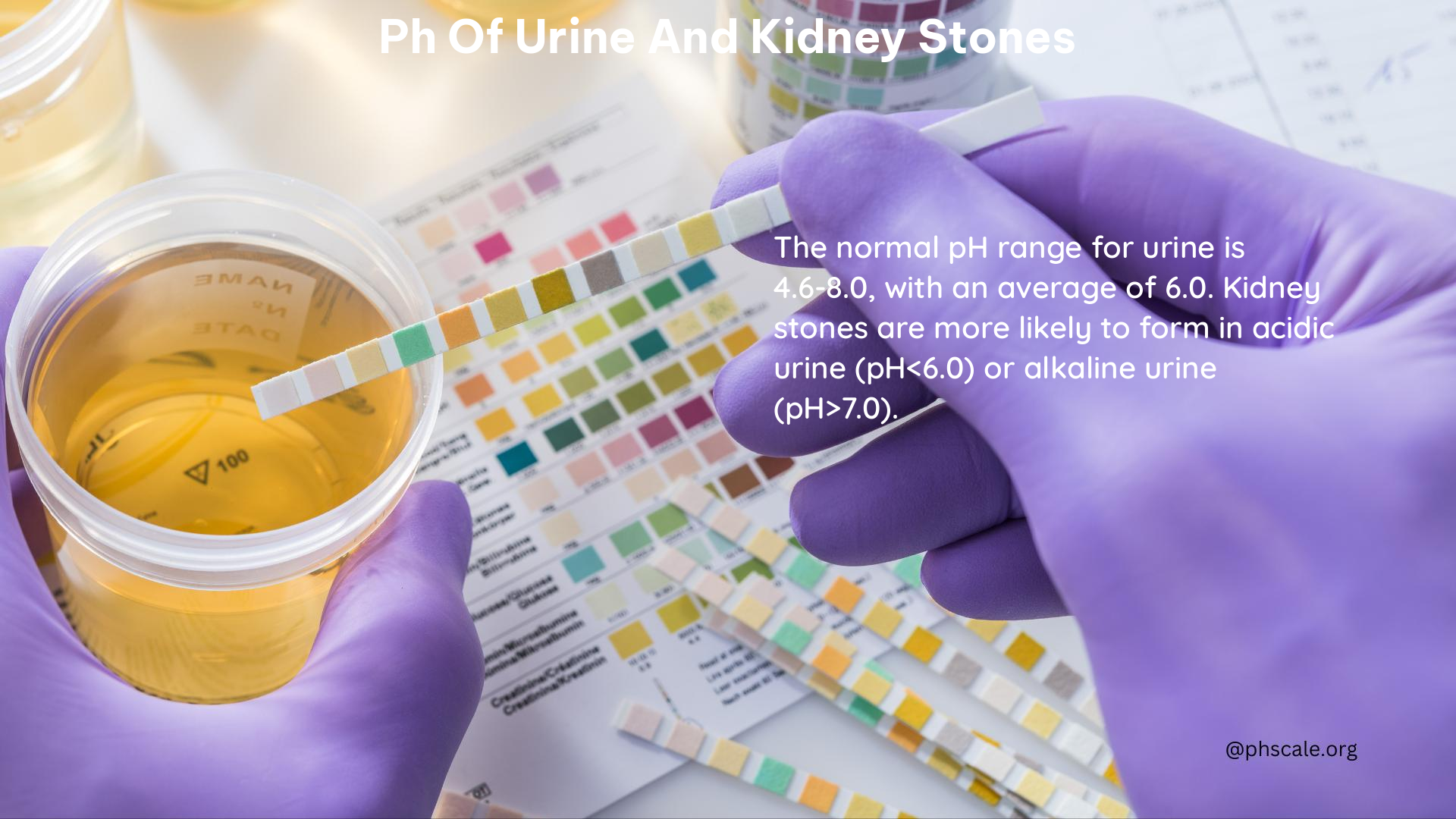The pH of urine plays a crucial role in the formation of kidney stones. Maintaining a balanced urine pH is essential for preventing the development of various types of kidney stones. In this comprehensive blog post, we will explore the relationship between urine pH and kidney stone formation, as well as provide practical tips for managing and preventing this common health issue.
Understanding Urine pH
The ideal pH range for urine is between 6.0 and 7.5, but it can vary from 4.5 to 8.0. The pH of urine is influenced by various factors, including diet, medications, and underlying medical conditions.
Acidic Urine pH (4.0-5.5)
- Favors the formation of uric acid and cystine stones
- Low urine pH is the most important factor leading to uric acid stone formation, as uric acid crystallizes at pH 5.5
- Obesity and insulin resistance can contribute to low urinary pH, increasing the risk of uric acid stones
Alkaline Urine pH (6.0-8.0)
- Favors the formation of calcium- and phosphate-containing stones
- Supersaturation of calcium phosphate increases rapidly as urine pH rises above 6.0
- High urine pH can be associated with calcium phosphate stones, especially in patients with hypercalciuria and hypocitraturia
Effects of pH on Calcium Oxalate Stones

Calcium oxalate stones are the most common type of kidney stones, and their formation is influenced by urine pH.
Acidic pH (4.0)
- Calcium oxalate monohydrate (COM) crystallizes with the greatest size, number, and total mass at pH 4.0
- Highest crystal-cell adhesion occurs at the most acidic pH
Basic pH (8.0)
- COM crystallization is least at pH 8.0
- Alkalinization may help prevent calcium oxalate kidney stone disease
Balancing Urine pH
Maintaining a balanced urine pH is crucial for preventing kidney stone formation. Several factors can influence urine pH, including diet and medications.
Dietary Factors
- Food intake can affect urine pH, with a diet high in animal protein increasing acid production and lowering pH
- A doctor may ask about dietary habits to evaluate the impact on urine pH
Medications
- Carbonic anhydrase inhibitors like acetazolamide can increase urine pH, making it more alkaline
Contaminants and Chemicals in Urine
Certain substances in urine can contribute to kidney stone formation, and their levels are influenced by urine pH.
Uric Acid
- A weak organic acid with a pKa of 5.5, which crystallizes at low pH
Calcium and Oxalate
- High levels of these ions can contribute to calcium oxalate stone formation, especially at alkaline pH
Citrate
- Low levels of citrate can increase the risk of calcium oxalate stones, as citrate inhibits stone formation
Home Remedies and Prevention
Adopting lifestyle changes and incorporating home remedies can help maintain a balanced urine pH and prevent kidney stone formation.
Dietary Changes
- Increase citrate intake through foods like lemons, oranges, and grapefruits to inhibit calcium oxalate stone formation
- Reduce animal protein consumption to minimize acid production and maintain a balanced pH
Hydration
- Drink plenty of water to dilute the concentration of ions and reduce the risk of stone formation
pH Monitoring
- Regularly test urine pH to identify any imbalances and adjust dietary habits accordingly
By understanding the role of urine pH in kidney stone formation and implementing the strategies outlined in this blog post, you can take proactive steps to maintain a healthy urinary system and reduce the risk of developing this painful and potentially recurrent condition.
References
- https://www.nature.com/articles/s41598-017-01953-4
- https://www.ncbi.nlm.nih.gov/pmc/articles/PMC6533969/
- https://www.medicalnewstoday.com/articles/323957
- https://pubmed.ncbi.nlm.nih.gov/21170875/
- https://www.scielo.br/j/jbn/a/tqCvXQFdJ3krf733pGYXjsH/
